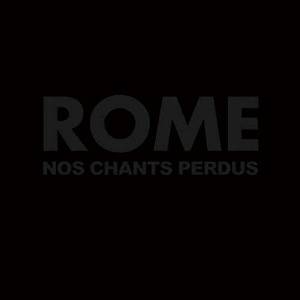
Title: Nos Chants Perdus
Artist: Rome
Genre: Acoustic / Folk
Release Date: 14th May 2010
Label: Trisol
Album Review
Humble as in modest. The music of ROME never has been something to call flamboyant or ornate. The music had always just the right amount of textures to work as indented by the two artists. Nevertheless, "reduction" is the catchphrase now. The new album sees the duo dropping all unnecessary weight from their songs, bringing them to a much more intimate face of their material. Not that intimacy hadn't been an integral part of the ROME songs all along; I think it was just never clearer than on 'Nos Chants Perdus' (The Forgotten Songs).
'L'Homme Revolte' emits a pull into another time, a time breathing the spirit of rebellion, the will to make a difference. A whistling breezes over and the rain starts falling, just as the sonic branches of the guitar tear us back to present and 'Les Deracines' whose acoustic yearning echoes from the walls of an invisible room with vague hints of electronic grandeur. 'Le Chatiment Du Traitre' doesn't seem to have the heaviness of the last offering, yet still enchants with the splendour of a very special kind of simplicity. 'L'Assassin' heralded the album's release and I suspect was the starting point for the duo to add alterations to their sound. The brittle waves of a glockenspiel precede the distant weeping of strings in the dark before Jerome Reuter gives melancholic warmth with his delivery. Still have to figure out what it is about this song that casts this enormous spell. Maybe one day I will find the answer in its serpentine paths.
'Les Exigences De La Foi' rather is a soulfully accentuated narrative, composed of fragile textures and a meaning that is lost within the French lyrics I can't understand. 'La Commune' follows a very earthly and more rhythmical approach with spherical electronic elements stripped out in favour of a good old organ. 'Les Isles Noires' then is all in the tradition of singer/songwriter and folk music, and by ROME terms has a surprisingly catchy chorus to go along with. 'Un Adieu A La Folie' has its roots struck equally into the soils of ambient and acoustic instrumentation, works with sustained operatic layers just as it does with sprinkling piano and acoustic guitar to breed a dense monument of sound. We conclude the album with 'La Rose Et La Hache'. Inspired by French traditional music and thus having lots of harmonium it tells the story of a man, apparently yearning for a woman and it's the yearning in his voice that gives the song that special attraction.
Sometimes I was inclined to use the term bonfire romantics, but that wouldn't be appropriate to use with ROME in one breath. Certainly, there is kind of a romantic spirit in there and the music turned out working at the bonfire of a festival already. But the content and the dignity radiating from the music proscribe to use a term like that. A truly huge album to last and it has to in the face of Jerome Reuter putting activities on hiatus for an indefinite time. But I have no worries it will.
Tracklist
01. L´Homme Revolte - 1:06
02. Les Deracines - 4:09
03. Le Chatiment Du Traitre - 3:44
04. L´Assassin - 4:08
05. Le Vertige Du Vide - 3:40
06. Les Exigences De La Foi - 1:5707. La Commune - 3:12
08. Sous La Dague - 4:17
09. Les Iles Noires - 3:42
10. Un Adieu A La Folie - 3:53
11. La Rose Et La Hache - 4:02
12. Chanson De Geste - 6:02
Line-Up
Jerome Reuter - Instruments, Vocals, Songwriting, Arrangements
Patrick Damiani - Instruments, Arrangements, Sound Design
Nikos Mavridis - Live-Violin
Website
http://www.romepage.eu/ / http://www.myspace.com/romecmi
Cover Picture

Rating
Music: 9
Sound: 9
Extras: -
Total: 9 / 10
{jos_sb_discuss:19}




